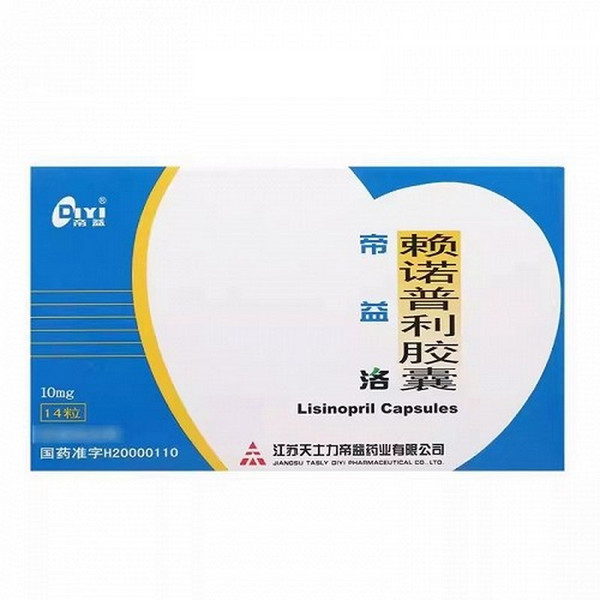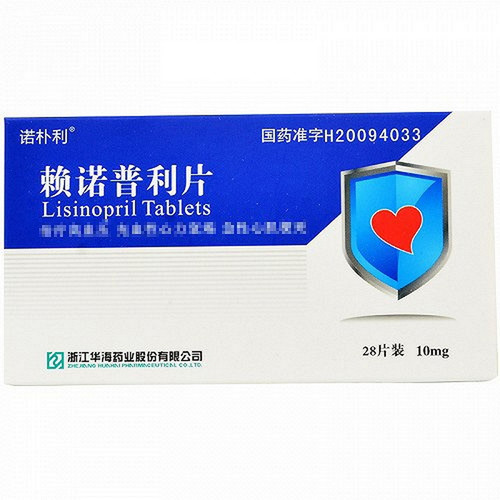Product Overview
[Drug Name]
Generic Name: Lisinopril Capsules
Trade Name: Diyi Luo
English Name: Lisinopril Capsules
Chinese Pinyin: Lainuopuli Jiaonang
[Ingredients]
Chemical Name: 1-[N₂-[(S)-1-carboxy-3-phenylpropyl]-L-lysinyl]-L-proline dihydrate. Molecular Formula: C₂₁H₃₁N₃O₄.2H₂O. Molecular Weight: 441.52.
[Properties]
This product is a hard capsule containing a white or off-white powder.
[Indications]
Hypertension (can be used alone or in combination with other antihypertensive medications such as diuretics).
[Dosage and Administration]
Absorption of this product is not affected by food. It can be taken once daily before, during, or after meals.
[Adverse Reactions]
Most patients tolerate this product well. Common side effects include mild and transient headache, dizziness, fatigue, drowsiness, nausea, and cough. The most common reasons for discontinuation are headache and cough. Rare adverse reactions include orthostatic hypotension, syncope, erythema and fatigue, and allergic/angioneurotic edema (occasionally occurring on the face, extremities, lips, tongue, glottis, and/or larynx). The following side effects have been reported rarely: Cardiovascular: ischemic heart disease or cerebrovascular disease (excessive drop in blood pressure leading to myocardial infarction or cerebrovascular accident, palpitations, tachycardia); Digestive: abdominal pain, dry mouth, hepatocellular or cholestatic hepatitis, cirrhosis; Nervous: emotional changes, confusion. Skin: Urinary tract infections, rash, sweating, photosensitivity, or other skin symptoms; Genitourinary: Uremia, decreased/anuria, renal insufficiency, acute renal failure, impotence; Other: Fever, vasculitis, myalgia, joint neuralgia/arthritis; Laboratory: Elevated blood urea and serum creatinine, slightly decreased hemoglobin and hematocrit, positive antinuclear antibodies, accelerated erythrocyte sedimentation rate, eosinophilia and leukocytosis, hyperkalemia.
[Contraindications]
1. Hypersensitivity to any component of this product. 2. A history of angioedema with angiotensin-converting enzyme inhibitors. 3. Patients with solitary kidney, transplanted kidney, or bilateral renal artery stenosis and renal impairment.
[Precautions]
1. Contraindicated in patients with bilateral renal artery stenosis and renal impairment. 2. If angioedema of the face or lips occurs, discontinue use immediately and use antihistamines to alleviate symptoms. Laryngeal angioedema can be fatal due to airway obstruction. Immediately administer 0.3ml-0.5ml of 1:1000 epinephrine solution subcutaneously and take measures to ensure airway patency. 3. Use this product with caution in the following situations: (1) Autoimmune diseases such as severe systemic lupus erythematosus, in which case the chance of leukopenia or granulocytopenia increases. (2) Bone marrow suppression. (3) Insufficient blood supply to the brain or coronary arteries. Ischemia may be aggravated by decreased blood pressure. (4) Hyperkalemia. (5) Renal dysfunction may cause elevated blood potassium, leukopenia and granulocytopenia, and retention of this product. (6) Patients with strict salt restriction, insufficient blood volume, or dialysis treatment may experience severe hypotension after the first dose of this product. 4. Inspections during use of this product: Patients with renal dysfunction or leukocytopenia should have their white blood cell count and differential count checked every 2 weeks for the first 3 months, and then regularly thereafter.
[Use in special populations]
Precautions for children:
The dosage for children has not been determined and is not sufficiently studied. In newborns and infants, there is a risk of oliguria and neurological abnormalities, which may be related to renal and cerebral ischemia caused by this drug's lowering of blood pressure.
Precautions During Pregnancy and Lactation:
Administration of ACE inhibitors by pregnant women can cause fetal and neonatal death. This drug should be discontinued immediately upon discovery of pregnancy. Use of ACE inhibitors during pregnancy (6-9 months) can cause hypotension, neonatal skeletal hypoplasia, anuria, reversible and non-reversible renal failure, and even death. It is not known whether this drug is excreted in human breast milk.
Precautions for the Elderly:
Age has no effect on the efficacy and safety of this drug. However, for elderly patients with renal impairment, the dose should be reduced and then adjusted based on blood pressure.
[Drug Interactions]
1. For patients with heart failure who are taking cardiac glycosides and diuretics and are already depleted of water and sodium, this drug should be started at a low dose. 2. Concomitant use with potassium-sparing diuretics such as spironolactone, triamterene, and amiloride may cause hyperkalemia, especially in patients with renal impairment. 3. Nonsteroidal anti-inflammatory analgesics, especially indomethacin, can inhibit renal prostaglandin synthesis and cause water and sodium retention, weakening the antihypertensive effect of this drug. 4. It exhibits a synergistic antihypertensive effect when used in combination with other antihypertensive drugs, with a particularly significant additive effect with drugs that induce renin release or affect sympathetic activity. 5. Concomitant use with lithium salts can reduce lithium excretion; lithium concentrations should be monitored.
[Pharmacological Actions]
Pharmacological Action: This drug is a competitive angiotensin-converting enzyme inhibitor. It prevents the conversion of angiotensin I to angiotensin II, reduces aldosterone secretion, increases plasma renin activity, and inhibits bradykinin degradation, reducing vascular resistance. Clinical trials have shown that the antihypertensive effect of this drug alone in African-American hypertensive patients (typically those with low renin) is lower than in other patients. This drug lowers blood pressure without causing reflex tachycardia. This drug dilates arteries and veins, reducing peripheral vascular resistance or afterload, and lowering pulmonary capillary wedge pressure or preload, thereby reducing pulmonary vascular resistance. This improves cardiac output in patients with heart failure and prolongs exercise tolerance and duration. Large-scale clinical trials have demonstrated that early use of this drug reduces mortality in patients with acute myocardial infarction.
[Storage] Store in a dark, sealed container.
[Strength] 5mg
[Packaging] 14 capsules per box.
[Expiry Date] 24 months
[Approval Number] National Medicine Standard H20020427
[Manufacturer] Company Name: Jiangsu Tasly Diyi Pharmaceutical Co., Ltd.








